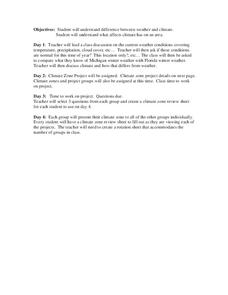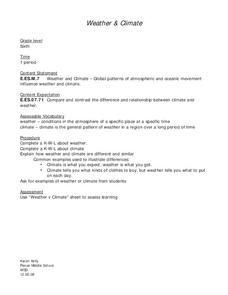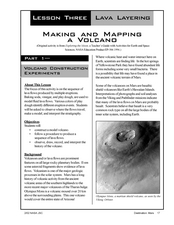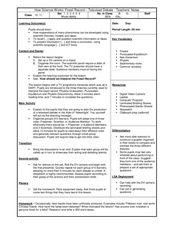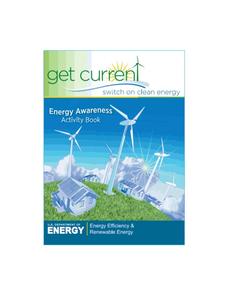CK-12 Foundation
Satellites, Shuttles, and Space Stations: Satellites in Orbit
Blast off! How do satellites, space shuttles, and space stations escape Earth's gravity and achieve orbit? Young astronauts study rocket science (literally) with an interactive lesson. They discover the four main uses for satellites, how...
Virginia Department of Education
Three Types of Rocks
Rock out with the second installment of a five-part series on earth materials and processes. Your budding geologists make observations of given rock samples and posit classification systems for rocks. They then learn about the accepted...
NOAA
Off Base
How does carbon dioxide affect the world's oceans? The final installment in a series of six lessons has pupils research ocean acidification, then conduct an experiment to witness the delicate balance that exists in our seas. Materials...
NOAA
Where Have All the Glaciers Gone?
What happens when ice melts? Well ... water happens. When that melting ice is a glacier, the amount of water that results produces change throughout the world. Middle school science sleuths uncover the truth about global warming, the...
K20 LEARN
Water We Going To Do? Floodplains And Watershed Management
How has human activity affected Earth's watersheds? An action-packed lesson plan, part of the K20 Center, examines water's ability to go with the flow regardless of what is in its path. Scholars build model watersheds, examine time-lapse...
Laboratory for Atmospheric and Space Physics
Polar Vortex Interactive
An interactive lesson places pupils as scientists who must learn why the ozone layer is being destroyed by analyzing the data from multiple satellites. The first analysis shows how UV is related to the ozone cycle. The second...
Curated OER
The Rifting of Pangaea and the Gettysburg Battlefield
Eleventh graders analyze and interpret an animated model of Earth’s rifting processes. For this Earth Science lesson, 11th graders connect Earth’s rifting processes with the Earth’s surface in the Gettysburg battlefield. Students apply...
Curated OER
Science Trail
Students explore the solar system by conducting Earth science experiments. In this Sun lesson, students identify the different seasons on Earth and discuss their purpose and cause. Students create a sundial and observe the changes to...
Curated OER
How We Impact the Earth
Students work in cooperative learning groups to create PowerPoint or KeyNote presentations on how humans impact the earth. This lesson can be accomplished in three different parts.
Curated OER
Glacier Presentations
Young scholars research news articles relating to global climate change. In this earth science lesson, students create a news broadcast using the information they gathered. They present this in class and each student gives their peer...
Curated OER
How Does Flowing Water Shape a Planet's Surface?
Students investigate how flowing water influence landforms. In this earth science lesson, students observe water behavior as it flows from the stream table at various inclinations. They discuss whether water shaped Mars landforms or not.
Curated OER
Lighthouses and Lenses
Young scholars explain the importance of lighthouses. In this earth science lesson, students investigate the focal lengths of Fresnel lenses. They research about the different lighthouses in their area.
Curated OER
Weather Versus Climate
Students differentiate weather and climate. In this earth science lesson plan, students investigate the climate of a zone they chose. They create a presentation and share their findings with the class.
Curated OER
Weather & Climate
Sixth graders differentiate weather and climate. In this earth science lesson, 6th graders complete a KWL chart about the two. They complete a worksheet by identifying whether a certain statement describes weather or climate.
Curated OER
Making and Mapping a Volcano
Students build a baking soda volcano model. In this earth science lesson, students identify the sequence of lava flows. They make a volcano map using their models.
Curated OER
What is Wind Chill?
Middle schoolers calculate wind chill using a mathematical formula. In this earth science lesson, students compare the wind chill in Antarctica to that of their local area. They explain how this can lead to hypothermia.
Curated OER
Volcanoes and Urban Planning
Students analyze satellite image data of Volcan Villarica. In this earth science lesson, students identify dangerous areas surrounding the volcano. They propose a new safe location for the town.
Curated OER
Lesson: Sand and Water
Young scholars review background information about water tension and adhesive forces on sand. In this sand science lesson, students visit a beach and have a sand building competition near water and away from it. Young scholars discuss...
Curated OER
How Science Works: Fossil Record - Televised Debate
Students compare the three theories used tp interpret fossil records. In this earth science lesson, students create a production of a televised debate. They collaborate with group members to generate relevant questions about the topic.
Curated OER
Environmental Studies: The Environment Rocks!
Rock exploration, so exciting! After reading the book Everybody Needs a Rock, the class makes sandwiches to better understand that the Earth is made in layers. They then use a description of the 3 types of rock to conduct an observation...
Curated OER
Reason for the Seasons
Young scientists examine why we have seasons on Earth, and how the motion of the Earth around the Sun causes them. Groups of learners are given a variety of balls, a bamboo stick, a marker, and a flashlight, then use the objects to...
San Francisco Public Utilities Commission
What is Groundwater? Our Underground Water Supply
Learn about the consequences of groundwater with a lesson about the different ways California handles water conservation and pollution. After reading a passage about the water table, learners apply what they have read to six...
Curated OER
Massif Mystery
After reviewing plate tectonic theories and the discovery of both the Atlantis Massif and the Lost City hydrothermal vents, earth science learners complete a worksheet and participate in discussions about what the types of rock found...
Curated OER
Energy Awareness Activity Book
If you are looking for worksheets about alternative energy sources to use on Earth Day, you'll find several here. However, since Earth Day is all about conserving natural resources, please print these double-sided in order to reduce the...
Other popular searches
- Earth Science Lesson Plans
- Earth Science Lesson Nevada
- Science Earth Day Lessons
- 5e Lesson Plans Earth Science
- 5e Earth Science Lessons
- Earth Day Science Lesson Plans
- Earth Science Lessons Moon
- Free Earth Science Lessons














